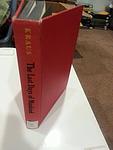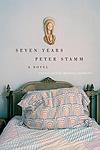The Greatest Austrian, Swiss "Drama" Books of All Time
Click to learn how this list is calculated.
This list represents a comprehensive and trusted collection of the greatest books. Developed through a specialized algorithm, it brings together 305 'best of' book lists to form a definitive guide to the world's most acclaimed books. For those interested in how these books are chosen, additional details can be found on the rankings page.
Genres
Drama is a genre of literature that typically deals with serious and emotional themes, often exploring the complexities of human relationships and the struggles individuals face in their lives. These books often feature intense character development and intricate plotlines, delving into the depths of human experience and the challenges of navigating the world around us. From family dramas to political intrigue, the drama genre encompasses a wide range of stories that aim to captivate readers with their raw and powerful storytelling.
Countries
Date Range
Reading Statistics
Click the button below to see how many of these books you've read!
Download
If you're interested in downloading this list as a CSV file for use in a spreadsheet application, you can easily do so by clicking the button below. Please note that to ensure a manageable file size and faster download, the CSV will include details for only the first 500 books.
Download-
1. The Piano Teacher by Elfriede Jelinek
"The Piano Teacher" is a dark exploration of power dynamics, sexuality, and repression. The story revolves around a piano teacher at a prestigious music school in Vienna who lives with her overbearing mother in a state of emotional and sexual repression. Her life takes a turn when she becomes sexually involved with a young, self-assured student. The relationship, marked by sadomasochistic games and emotional manipulation, spirals out of control, leading to a tragic end. The book is a profound critique of bourgeois values and the oppressive structures of society.
The 1057th Greatest Book of All Time -
2. Confusion by Stefan Zweig
"Confusion" is a compelling narrative that explores the intense and passionate relationship between a student and his charismatic professor. Set in the early 20th century, the story unfolds as the protagonist becomes entangled in the professor's personal life, discovering his mentor's secret past, his struggling marriage, and his hidden homosexual desires. The book presents a profound exploration of human emotions, identity, and the complexities of love, against the backdrop of the societal norms of the time.
The 2016th Greatest Book of All Time -
3. A Sorrow Beyond Dreams by Peter Handke
This book is a poignant exploration of the author's mother's life and her struggle with depression, ultimately leading to her suicide. It provides a deeply personal and raw account of the author's attempts to understand his mother's despair and the societal constraints that contributed to it. The narrative is a profound reflection on memory, loss, and the complexity of human emotions, offering a stark and moving portrayal of a woman's life in a rigid, post-war society.
The 3042nd Greatest Book of All Time -
4. Why Is There Salt In The Sea? by Brigitte Schwaiger
The novel explores the life of a young Austrian woman who finds herself in a stifling marriage with a fisherman in a small coastal village. As she grapples with the mundane and oppressive nature of her daily life, she yearns for freedom and self-discovery. The sea, with its salt, becomes a metaphor for her tears and the bitterness she experiences, as well as the vast possibilities that lie beyond her current existence. Her internal struggle and the choices she faces reflect the broader themes of women's liberation and the search for identity in a world that often limits female autonomy.
The 3743rd Greatest Book of All Time -
5. The Last Days of Mankind by Karl Kraus
"The Last Days of Mankind" is a satirical play that provides a critical commentary on the socio-political climate during World War I. The narrative presents a stark portrayal of the absurdity of war and the destructive forces of propaganda, bureaucracy, and nationalism. The author uses a variety of literary techniques, including parody, satire, and direct quotes from contemporary sources, to highlight the folly and tragedy of war. The play is known for its unique style, rich language, and its profound critique of society and culture during a time of great upheaval and conflict.
The 4688th Greatest Book of All Time -
6. The Visit by Friedrich Dürrenmatt
The narrative revolves around the return of a wealthy woman to her impoverished hometown, where she offers the residents a disturbing proposition: a vast fortune in exchange for the life of the man who wronged her in her youth. As the townspeople's initial horror gives way to the corrupting influence of the promised wealth, moral integrity collapses, leading to a dark and cynical exploration of human nature, justice, and revenge. The story serves as a powerful commentary on the capacity for greed to erode community values and the price of justice in a world governed by materialism.
The 5737th Greatest Book of All Time -
7. Kaspar and Other Plays by Peter Handke
"Kaspar and Other Plays" is a collection of avant-garde, thought-provoking plays that explore deep philosophical questions about language, reality, and the human condition. The titular play tells the story of a young man who learns to speak and, in doing so, is manipulated and controlled by society. The other plays in the collection continue to challenge conventional ideas and push boundaries, offering a unique and profound commentary on the world.
The 5738th Greatest Book of All Time -
8. Selected Plays And Libretti by Hugo von Hofmannsthal
This collection brings together a selection of dramatic works by a prominent figure in the early 20th-century literary world, showcasing his talent for blending poetic language with profound psychological insight. The plays and libretti included span various genres, from historical dramas to adaptations of classic myths, each marked by the author's exploration of themes such as identity, transformation, and the human condition. The works also reflect the author's collaboration with influential composers of his time, contributing to the evolution of opera and theater through his innovative approach to storytelling and character development.
The 7168th Greatest Book of All Time -
9. The Physicists by Friedrich Dürrenmatt
"The Physicists" is a satirical play that delves into the ethical dilemmas faced by scientists in the nuclear age. The story is set in a mental asylum where three patients believe they are Albert Einstein, Isaac Newton, and Johann Wilhelm Möbius. However, it is later revealed that two of them are spies, attempting to get a hold of Möbius's scientific discoveries, while Möbius himself pretends to be insane to prevent his dangerous knowledge from falling into the wrong hands. The play explores themes of responsibility, morality, and the potential misuse of scientific advancements.
The 7168th Greatest Book of All Time -
10. Plays And Stories by Arthur Schnitzler
"Plays and Stories" is a collection that showcases the work of a prominent writer known for his incisive exploration of psychology and morality in turn-of-the-century Viennese society. The book brings together a selection of his dramatic and narrative pieces, each delving into the complex lives and intimate struggles of its characters. Through a blend of sharp dialogue, intricate character studies, and a keen observation of social mores, the collection reveals the subtle forces at play in love, desire, and power, often highlighting the ironic twists of fate that can alter the course of an individual's life. The writer's work is celebrated for its nuanced depiction of the human condition and its influence on modernist literature.
The 7168th Greatest Book of All Time -
11. Seven Years by Peter Stamm
"Seven Years" is a novel about a complex love triangle. The protagonist is a man who's married to a woman he doesn't love, while he's obsessed with another woman who he doesn't understand. The novel explores the themes of love, desire, and the passage of time, as it jumps back and forth between different periods in the protagonist's life. Over the course of seven years, the protagonist grapples with his feelings and the consequences of his actions, leading to a series of dramatic and emotional revelations.
The 8302nd Greatest Book of All Time -
12. Professor Bernhardi by Arthur Schnitzler
The play revolves around a Jewish physician who heads a Viennese clinic and becomes embroiled in a scandal when he prevents a Catholic priest from giving the last rites to a dying patient who is unaware of the seriousness of her condition. His actions, motivated by a desire to preserve the patient's peace of mind, are misinterpreted as anti-Catholic, leading to a public outcry and a power struggle that reflects the deeply ingrained anti-Semitism and political opportunism of the time. The doctor's principled stand becomes a flashpoint for societal and professional conflict, raising questions about ethics, religion, and the corrosive effects of prejudice.
The 10983rd Greatest Book of All Time -
13. Tales From The Vienna Woods by Ödön von Horváth
This narrative is a darkly comedic and ironic tale set in 1930s Austria, which delves into the lives of ordinary Viennese citizens as they grapple with the socio-economic pressures of the time. The story revolves around a young woman who, in her pursuit of happiness and escape from a suffocating family, becomes entangled in a series of romantic relationships that lead to disillusionment and tragedy. The work critiques the romanticized vision of Vienna by juxtaposing the city's charming waltzes and idyllic woods against a backdrop of moral decay, hypocrisy, and the looming shadow of fascism.
The 10987th Greatest Book of All Time -
14. The Fire Raisers by Max Frisch
The play centers around a complacent businessman who, despite clear warnings and evidence, naively allows two sinister guests to move into his attic, where they steadily accumulate the means to ignite a conflagration. As the story unfolds, it becomes apparent that the businessman's willful ignorance is an allegory for the rise of fascism and the way society can turn a blind eye to the dangers of totalitarian ideologies. The play is a darkly comedic and critical examination of moral cowardice, collective responsibility, and the consequences of inaction in the face of clear and present danger.
The 11001st Greatest Book of All Time
Reading Statistics
Click the button below to see how many of these books you've read!
Download
If you're interested in downloading this list as a CSV file for use in a spreadsheet application, you can easily do so by clicking the button below. Please note that to ensure a manageable file size and faster download, the CSV will include details for only the first 500 books.
Download










